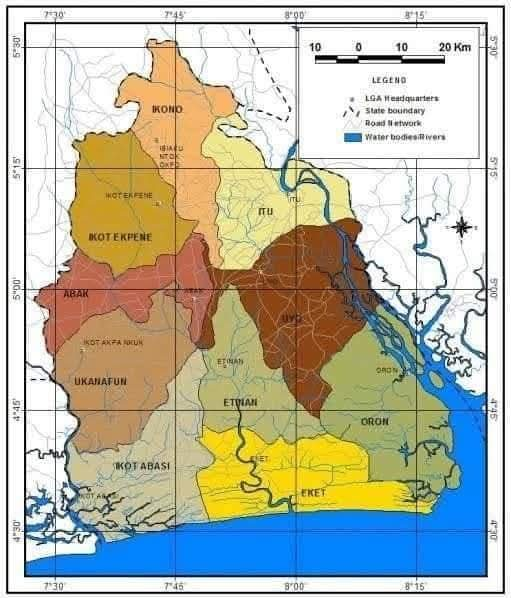By Pius Ebong.
We begin a new series on Business and Investment opportunities in Akwa Ibom State. Our main focus for now shall be on Solid Mineral Resources where we recently discovered a comparative advantage. The soil of Akwa Ibom State is rich in Industrial Mineral, some of which include Kaolin clay, Silica Glass Sand, Limestone, Lignite, Industrial Salt and Rare Earth Element. Solid Minerals are the most utilized raw materials in the world today, hence they are very critical to every nation’s economic development . They find application in a wide range of industry, and in every area of human endeavour. Iron, Aluminium, Clay, Glass, Limestone etc. constitute the foundation of economic development of nations. Rare Earth Elements are strategic in electronic, power generation, military, defense, security, nuclear and aerospace technology programs of some countries. Today we take a look at the potentials in clay resources in Akwa Ibom State and the possibility of commercial exploitation for the benefit of the citizens.
.Varieties of clay minerals occur in various locations in the State, some of which have been mined for over a century. Kaolin Clay is one of the non-metallic minerals found in commercial quantity in the State. However, there are large deposits of ball clay, bentonite, silica clay, fire clay, earthenware clay, and red clay in Itu, Ikot Ekpene, Etinan, Eket, Nsit Ubium, ini and Uruan Local Government Area. Clay resources inthese locations are proven to be of the best quality, and are available for commercial exploitation for over a hundred years of intensive exploitation. Kaolin Clay in Ikot Ekwerre, Ikot Ebom Itam in Itu local government area, have been used for the production of ceramics by the defunct Quality Ceramics Company since the close of the last century.
Despite the use of Rubber and plastics products, Clay products remain effective, more hygienic durable and sustainable for many applications. From construction to packaging, decorations, aesthetics, waste disposal, agriculture, electrical appliances, thermal technology clay uses and applications are numerous. Generally, clay is used for the manufacture of ceramics, paper, pharmaceutical products. It is also widely used in pottery, tiles, foundry molds, glass, refractories, bricks, electrical insulators and pigments. Some ceramics products from clay resources include plates, bowls, cups, saucers, toilet sinks, bidets, tiles, jars, vases, spark plugs, crucibles, furnaces, high temperature kiln, sculptures, figurines, cookwares, pots, pans laboratory equipment, dental and medical implants, surgical devices, automotive parts, jewelry and aerospace components etc. These products are needful for our economy but unfortunately almost all of them are imported from China, Europe and America.
One of the developmental indices of nations is the volume of industrial output, which invariably depends on the availability and proper utilization of raw materials, principally mineral resources. Hence, industrial minerals are ultimately the real determinant of the wealth and strength of a nation. There is a saying that you use what you have to get what you want. Akwa Ibom State has one of the finest quality clay Minerals in the world. This can easily be put to a commercial use, especially now that the nation’s economy begs for diversification. Genuine industrialization and meaningful wealth creation can only be achieved through a coordinated effort of government and active participation of the business community.
Fortunately, Government has recently confirmed availability, and gone a step to document the quality, location and reserve estimation of certain industrial minerals in the State. This vital information could be found in a publication titled “Geo-scientific Data Base of Mineral Resources of Akwa Ibom State” an Investors Guide. Mineral value chain follows the processes of prospecting, exploration, exploitation, beneficiation and utilization. The first and most crucial part has been successfully undertaken by Government. The next in the industrial chain will be for citizens to seek to develop commercial mines to extract and process this mineral for further industrial application.
Investment in kaolin Clay exploitation could become a top revenue earner for a State that is largely dependent on federal allocation for every item of expenditure. Individual Investors, Corporate Organizations and Government Agencies, in collaboration with other Institutional Investors can establish commercial ventures to explore the enormous potentials in clay/ceramics market in Nigeria and in the west African sub-region. Preliminary Feasibility report for setting up a ceramic manufacturing plant and related products in Akwa Ibom State has proven to be positive and encouraging. A combination of abundance of raw materials (kaolin clay, feldspar, and quartz deposits) in Nigeria , a growing market demand for ceramic products for construction, tableware, and decorative items, coupled with a limited local production/reliance on imports, makes Akwa Ibom State viable for investment in ceramics Industries. Similar industries are found in Kogi and other states in the country.
A medium-sized plant can produce a range of ceramic products, creating about 2000 direct and indirect jobs in the society, thereby generating revenue for citizens. Market size for ceramics product in Nigeria is estimated at ₦50 billion annually. Approximate cost for building a medium (10,000 tons per annum) ceramic production plant in the state, is in the region of two and a half billion Naira (N2.5 Billion), depending on the brand. This includes expenses like procurement, building or leasing a production facility, raw materials, marketing, hiring skilled workers, research and development, legal fees, transportation, and investment in inventory and warehousing. Break-even period for a proper commercial venture is 3-5 years. Challenges in this project are power supply, skilled labor and training.
There are many Nigerians, some of whom are Akwa Ibom State indigenes with enough financial resources to set up ceramics manufacturing factories. We cannot always depend on foreign investors, some of whom are dubious in nature. Hospitality, transport and real estate related businesses are good, but not only hotels and petrol stations that make profit. Manufacturing is a long term business project. Returns on investment is sure, steady and prolonged when properly managed.
In conclusion therefore, I make bold to say that with a high demand for products, abundant raw materials, and a good potential for growth, setting up a ceramic manufacturing plant in Akwa Ibom State is not only feasible, but potentially profitable. Addressing the above challenges, conducting a thorough research and provision of adequate finances will ensure good success and a high return on investment.
This is the time to consider investment in Solid Mineral Sector in Akwa Ibom State
Next article will highlight the potential in Silica Glass Sand and all related products.
For a comprehensive Feasibility Report and Business Development Plan, please contact the Editor.
Pius Ebong is a Metallurgical and Material Engineer, a Solid Mineral Development Consultant, a Concerned Citizen of Nigeria, and a proud son of Uyo in Akwa Ibom State.



